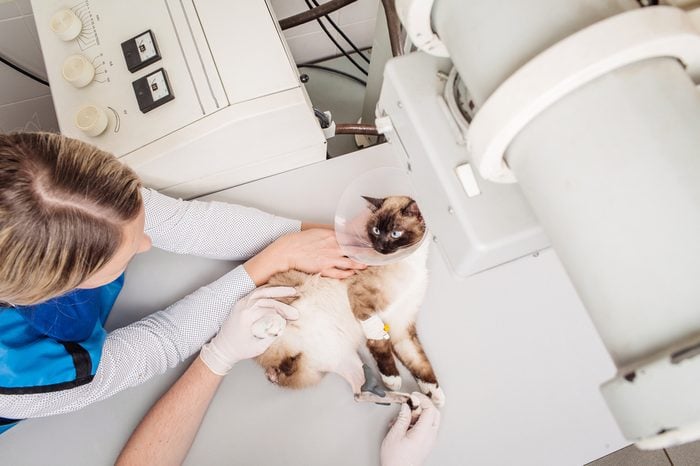
The dangers of misdiagnosing
A sick pet can be a scary thing. Many times, when our beloved furbabies start acting abnormally or displaying unusual symptoms, our first instinct is to run to the internet and ask Dr. Google, which usually goes one of two ways. Commonly, the most innocuous symptoms lead to an errant diagnosis of something terrifying, like brain cancer. Or a serious problem can be misdiagnosed as something benign. Treatment then is more intense and more costly than if the owner had brought the pet to the animal hospital in the first place.
According to Heather Dean, DVM, a small-animal veterinarian practicing in Georgia, it’s not just misdiagnoses that are a problem, it’s treatments as well. “Owners will also turn to the internet for advice on treating conditions or preventing disease at home, says Dean. “For example, the dose of ivermectin in commercial heartworm preventatives has been proven safe in all breeds of dogs, but “a little bit” of ivermectin-containing horse dewormer can be life-threatening, especially in sensitive breeds.”
If your pet is showing any unusual symptoms at all, and you are concerned he may be sick, call your vet. Here are just a few of the most commonly misdiagnosed diseases. and don’t miss the silent signs your seemingly healthy dog is actually sick.

Urinary tract infections
Urinary tract infections (UTIs) in cats can be life threatening, but an online search for the symptoms might lead you to believe that inappropriate urination or “peeing outside the litterbox” could be a behavioral rather than a serious health issue. Crystals can develop in the urine, and in males the urethra might become blocked or clogged by the crystals, causing urine to fill the bladder. If not treated quickly, a cat can die. Treatment consists of a stiff plastic catheter being inserted into the urethra of the sedated cat, dislodging the crystals and allowing the bladder to drain. The cat will then be hospitalized with an in-dwelling catheter sutured in place until all swelling and inflammation goes down and the animal is able to urinate on its own again. You can train a cat to use a toilet, and other live-changing things.

Diabetes
Conversely, inappropriate urination in dogs is usually assumed to be a UTI. Google searches for UTI treatment yield natural remedies from cranberry juice to apple cider vinegar, but sometimes, especially in older dogs, urinary changes are a red flag for diabetes, which can be fatal if left untreated. Once controlled with medication, diabetic dogs can live many more years. Here are 10 things you must know before using essential oils on dogs.

Kidney disease
Just as with diabetes, an early sign of kidney disease can be increased or inappropriate urination. Left untreated, the pets can die of kidney failure. If diagnosed by a veterinarian and treated appropriately, both dogs and cats can live many years with kidney disease. Don’t miss these 10 silent signs your healthy dog is actually sick.

Fleas
Owners never want to admit that their pets have fleas. Internet searches will frequently list allergies as the cause for itchy skin or hair loss, which can be expensive to treat. More commonly though, the culprit is fleas, which are easy to treat with Frontline or one of these home remedies for fleas.

Soft-tissue injuries
Dogs and cats can develop a limp for a number of causes, including injuries to ligaments and tendons. Owners often ignore a limp, because internet searches frequently recommend taking a wait and see approach. Among the worst things owners can do for a pet’s limp is to treat him with anti-inflammatory medicines intended for humans, such as acetaminophen or ibuprofen, both of which are highly toxic to and can be fatal to both dogs and cats. Be sure to check out these 50 secrets your pet won’t tell you for more tips on keeping your pooch healthy and happy.